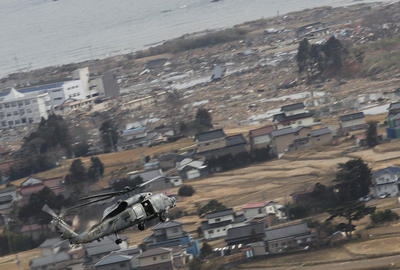The concept’s distinctive dimension was the prioritisation of non-military over traditional military threats. It was articulated as a merger of three concepts — self-defense, non-military diplomacy and natural disaster response. From today’s perspective, the most interesting aspect of comprehensive security was the inclusion of natural disasters as a major threat. At the time, many observers scratched their heads at the inclusion of earthquakes in a national security doctrine, but today, natural disasters, climate change and pandemics constitute part of the pantheon of non-traditional security threats. Japan now appears to have been ahead of the curve.
Although Japan’s comprehensive national security doctrine faded away, the experience at Fukushima may be a source of new direction and insight for the re-emergence of an updated doctrine. Fukushima has shown the potential depth of the US-Japan relationship, and may initiate a renewed emphasis on resource diplomacy, civil-military diplomacy, and a new political approach to managing crisis.
One of the more striking images coming out of Sendai is the partnership between the Japanese Self Defence Force (SDF) and the US military in ‘Operation Tomodachi’ (‘Operation Friendship’), emerging on the heels of recent military exercises. This joint approach was initially envisaged as a response to a military attack on Japan. Instead, natural disaster has brought the two forces together. Although cooperation is strong now, questions arise as to whether the SDF’s attention will turn inward, and away from Operation Tomodachi, and perhaps whether the US will need to take a stronger lead role, which may lead to bilateral friction. But the original comprehensive security concept reflected, in part, Japanese concern over a perceived slippage in American military power after the fall of Saigon, with a sense that the US would not be eager to come to Japan’s aid. This recent cooperation may have set aside any current doubts.
Comprehensive national security included a focus on ‘resource diplomacy’ (exercised through foreign aid), and the search for alternative energy sources, following the 1974 OPEC oil shock.
Fukushima has already touched off a global debate over nuclear energy. This wrangling may cast fossil fuels from the Middle East in a new light. Japan may have to become more engaged in that region’s diplomacy, especially since its main relationships had been forged with the regimes now being shaken. Resource diplomacy with Africa and other regions may also become more significant. The relationships may be defined by competition with China — which is exercising its own resource diplomacy in Africa through generous foreign aid. This competition for resources may define Japanese foreign policy, with China joining the US as formative twin pillars.
Perhaps the most unexpected outcome of comprehensive security might be the emergence of Japanese-type civil-military diplomacy as an outgrowth of the SDF’s performance in Fukushima. For a self-defined pacifist country with a culture of anti-militarism, this might seem like a major transformation. Actually, the SDF’s role in Sendai, a combination of a US-type Army Corps of Engineers and the National Guard, has been seen overseas paired with civilian relief operations since the late 1990s. The SDF mandate also incorporates international peacekeeping and peace-building, and in Iraq, Japan dispatched a Civil-Military (CIMIC) operation that was neither disaster relief nor peacekeeping. The SDF lessons from Fukushima can potentially find their way to other countries in the future.
Comprehensive national security called for effective crisis management of earthquakes. So far, the political response has been mixed. Prime Minister Naoto Kan deemed Fukushima the greatest calamity since World War II, but he may not survive this crisis politically. The opposition Liberal Democratic Party is thus far rejecting Kan’s effort to create a bipartisan approach. This crisis poses a test for the political system as well as political leaders.
Maybe there was a reason why the comprehensive national security vision came not from political leaders but from an outside commission. This time, without effective leadership, the crisis may have long-term ripple effects on Japanese political culture and result in a new doctrine — comprehensive national insecurity.
Dennis T. Yasutomo is Professor of Government and East Asian Studies at Smith College, Northampton, Massachusetts.


Warning: reset() [function.reset]: Passed variable is not an array or object in /home3/eastasia/public_html/wp-content/plugins/extra-comment-fields.php on line 198
Warning: current() [function.current]: Passed variable is not an array or object in /home3/eastasia/public_html/wp-content/plugins/extra-comment-fields.php on line 199
It does not appear to be the most appropriate way to cast the Japanese responses to the still ongoing natural disasters and nuclear power reactors in the way presented in the article and link that to other issues such as resources diplomacy in Africa and competition with China.
China has offered deep sympathy in the wake of the natural disasters and also offered various aid including oil, rescue teams, and financial donations.
It is regrettable and indeed a pity to see such an insensitive approach to completely unnecessarily raise issues of rivalry between Japan and other countries at such a critical time.
First, it is clear that the complexity of world politics has made Lincoln Fung pretend to be Chinese.
Second, to this day I don’t think the US intelligence even understands that the Japanese Liberal Democratic Party’s comprehensive national security included the shocking 9/11 events.